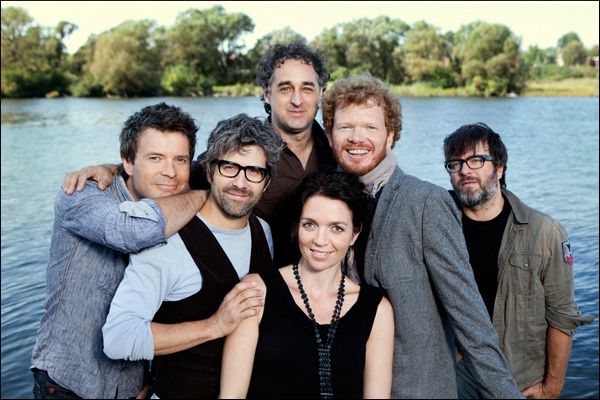Mes Aïeux are a popular Quebecois folk band that have adopted traditional sounds and instruments from Quebec’s past in contemporary ways. The depth of their sound and innovative use of traditional materials is remarkable, but they have found even more notoriety through their lyrics. Much of their music questions Quebecois identity and how it comes to terms with an increasingly globalized world. Some of it has an even wider reach, delving into society’s environmental and cultural policies, which they believe put humanity’s future at risk. Though focused on the powerful connection we should maintain with our past, Mes Aïeux are equally concerned about the future.
"Mes Aïeux are a popular Quebecois folk band that have adopted traditional sounds and instruments from Quebec’s past in contemporary ways."
The band’s third album, En Famille, released in 2006, proved to be their best success to date, and one song in particular captured the imagination of Quebec. The album’s opening track, “Dégéneration,” charts the evolution of five generations of a Quebec family and their changing relationships to each other as well as to the land they live on. The song depicts the legacy of the working class in Quebec. For much of its history under British colonization, its members were viewed as second class citizens. They worked the land at the mercy of the seasons’ whims and lived a relatively hard life. As history moved on, they were able to elevate their social status and eventually gain control over their own identity, culture, and economic growth.
In a similar vein, the song demonstrates that, for women in previous generations, the Church was of utmost importance. Up until the mid-20th century, it was not unusual for Quebec families to have up to ten children, and a lot of Quebec literature and art deals with how leaving behind this status quo challenged the very identity of women and families. The most famous example is probably a play by Quebecois writer Michel Marc Bouchard, Les Muses Orphelines, which depicts the story of three grown children coming to terms with their mother’s decision to leave them behind under the pressure of the community and church to continue having children with a man who made her unhappy. The uncertainty and cynicism of Bouchard’s book reflects a modern view of the pre-60s era, a time which is often looked back upon with careful nostalgia, acknowledging that it was a dark period for many French Canadians in Quebec.

The lyrics of "Dégéneration" offers a counter-point to this view. The song’s title does not suggest an evolution so much as a degeneration of values and even culture. Though it doesn’t take a black-and-white stance, the song implies that elements of community, environmentalism, and the arts have been lost in the hustle and bustle of contemporary life, and that perhaps we should rethink our dismissal of this dark period and learn from it. Even the band’s name harkens back to these themes, as it literally translates into “my ancestors.”
Language is integral to this song, as it is to most of Mes Aïeux’s work. Their relationship to folk traditions is upheld through their use of joual language (or Quebecois French), and it adds a distinct rhythm to their work. For Anglo-Saxons unfamiliar with Quebecois music, Mes Aïeux perhaps come closest to Celtic or maritime styles, which is of no surprise as both have a close relationship to Quebecois music in Canadian history. Mes Aïeux exaggerate an abbreviated syntax to create linguistic breaks and intonations within their songs, making the style of the language as important as its content.
"The song implies that elements of community, environmentalism, and the arts have been lost in the hustle and bustle of contemporary life."
Their particular choice of words is also interesting, as they employ words that are not necessarily used popularly in our day, referring back to older generations and expressions. Words like “lopin,” though entirely correct, are not part of normal everyday vernacular and would today probably be replaced by a word like “terrain” or even an Anglicism. Certain expressions used in the song are also exclusive to Quebec, like “cennes noires,” which is a mispronunciation or abbreviation of “centième de dollar.” An interesting experiment to better understand this song is to open up several different web pages with its lyrics and read the diverse interpretations of the spoken language. This will also demonstrate quite clearly the full extent of the joual syntax of abbreviations and reinterpretations.
The song has maintained its popularity in the past few years, and is still a radio favourite in Quebec. Many feel a connection to the past and it has become a point of pride in being able to re-appropriate the values and feelings of our grandparents and the lives they lived. The song questions the priorities of our contemporary life with the gleeful energy of a sort of neo-folk sound.

Lyrics:
Ton arrire-arrire-grand-pre, il a dfrich la terre
Ton arrire-grand-pre, il a labour la terre
Et pis ton grand-pre a rentabilis la terre
pis ton pre, il l'a vendu pour devenir fonctionnaire
Et pis to mon p'tit gars, tu sais pu c'que tu vas faire
Dans ton p'tit trois et d'mi ben trop cher, frte en hiver
Il te vient des envies de dev'nir propritaire
Et tu rves la nuit d'avoir ton petit lopin d'terre
Ton arrire-arrire-grand-mre, elle a eu quatorze enfants
ton arrire-grand-mre en a eu quasiment autant
Et pis ta grand-mre en a eu trois c'tait suffisant
pis ta mre en voulait pas, toi t'tais un accident
Et pis to ma p'tite fille, tu changes de partenaires tout l'temps
Quand tu fais des conn'ries, tu t'en sauves en avortant
Mais y'a des matins, tu te rveilles en pleurant
Quand tu rves la nuit d'une grande table entoures d'enfants
Ton arrire-arrire-grand-pre, y'a vcu la grosse misre
Ton arrire-grand-pre, il ramassait les cennes noires
Et pis ton grand-pre, miracle, y'est devenu millionnaire
Ton pre en a hrit, il l'a tout mit dans ses rers
Et pis to p'tite jeunesse tu dois ton cul au ministre
Pas moyen d'avoir un prt dans une institution bancaire
Pour calmer tes envies de hold-uper la caissire
tu lis des livres qui parlent de simplicit volontaire
Tes arrires-arrires-grands-parents ils savaient comment fter
Tes arrires-grands-parents a swingnaient fort dans les veilles
Pis tes grands-parents ont connu l'poque y-y
Tes parents c'tait les discos c'est l qu'ils se sont rencontrs
Et pis to mon ami qu'est-ce que tu fais de ta soire
teins donc ta T.V. faut pas rester encaban
Heureusement que dans vie certaines choses refusent de changer
Enfiles tes plus beaux habits car nous allons ce soir danser




